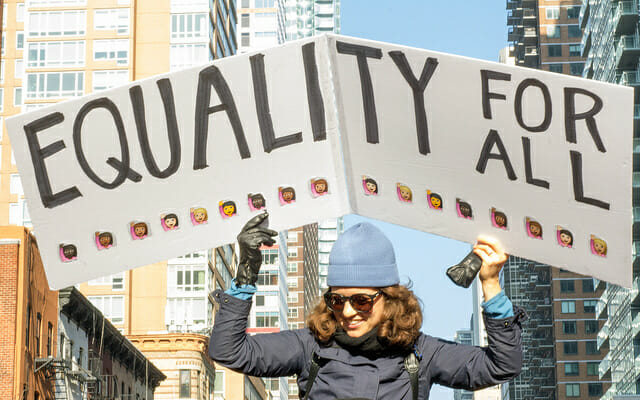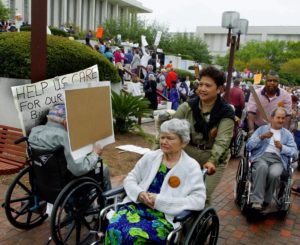‘Pink Tax’ Applies to Mortgages, Cars and Other Markets, Report Finds
A congressional watchdog agency says women pay more than men for items that extend far beyond the toiletry section, such as big-ticket, gender-neutral goods and services. A protester at the 2017 Women's March in New York. (Shaun Dawson / Flicker)
A protester at the 2017 Women's March in New York. (Shaun Dawson / Flicker)
It’s not only shaving gel and razors that have women parting with more pennies than men do. A recent report by the U.S. Government Accountability Office (GAO) found that women are paying a “pink tax” on big-ticket goods and services: mainly mortgages, cars and car repairs.
In a survey of academic findings, the GAO found that “women as a group pay higher interest rates on average than men” in respect to mortgage loans.
The congressional watchdog agency was quick to stipulate the finding was in part due to women’s weaker credit profiles. A study by the Urban Institute concluded, however, these aspects may not be the most appropriate in assessing loan repayment and interest rates. Although female borrowers have higher rates of attaining subprime loans and possess weaker credit portfolios, the institute concluded:
… [W]eaker credit characteristics do not accurately predict how well women pay their mortgages. Holding all credit characteristics constant, female-only borrowers default less than their male counterparts. This finding is true for white, African American, and Hispanic women. The bottom line: single women with mortgages are doing a better job of paying their mortgages than their credit characteristics predict. Because the higher price they pay for their mortgages is based on their credit characteristics when they take out the loan, this means single women borrowers are paying too much for their mortgages.
The GAO report found that females were often quoted higher prices on cars than their male counterparts and price disparities were only mitigated when buyers purchased online. Car repairs were also quoted higher for women, but one study included in the GAO report found “women were quoted higher prices than men if they seemed uninformed about the cost of car repair when requesting a quote, but the price differences disappeared if the study participant mentioned an expected price.”
The GAO also found women have less access to small-business loans. Multiple reviewed academic studies conclude that although interest rates remained constant for both genders, women were more likely to be denied loans, receive smaller loans or not apply at all in fear that their request would be rejected.
One of the commissioners of the GAO report, New York Democratic Rep. Carolyn B. Maloney, commented Friday, “This targeted, thoroughly researched study from the GAO shows that in ways both large and small, women are disadvantaged in a variety of markets.”
Your support matters…Independent journalism is under threat and overshadowed by heavily funded mainstream media.
You can help level the playing field. Become a member.
Your tax-deductible contribution keeps us digging beneath the headlines to give you thought-provoking, investigative reporting and analysis that unearths what's really happening- without compromise.
Give today to support our courageous, independent journalists.



You need to be a supporter to comment.
There are currently no responses to this article.
Be the first to respond.